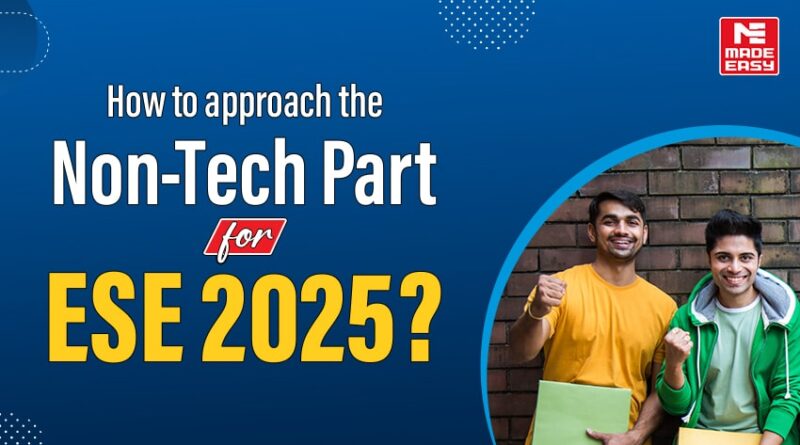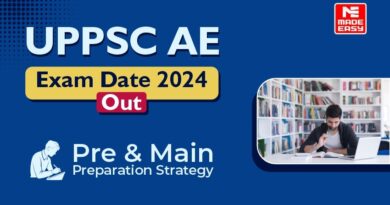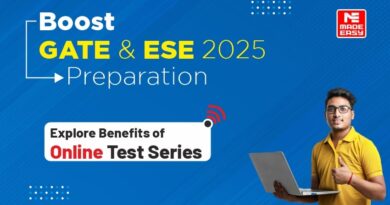How to approach the Non-Tech part for ESE 2025?
The dream of achieving a good and respectable job in the government engineering sector makes several engineering aspirants aim to prepare for and qualify the Engineering Services Examination. Apart from this, the perks and privileges associated with the designation motivate candidates to prepare well for ESE 2025.
While most of the students are confident about the technical part of the examination, the ESE non-tech syllabus puts a decent number of applicants into great confusion and dilemma. Many students are unaware of how to study non-technical topics to pass the ESE preliminary stage successfully. In addition, they often lack an understanding of the importance of non-technical topics for engineering students and the right way to strike the required balance between the technical and non-technical parts of the ESE.
UPSC ESE 2025: Notification Released for 457 Vacancies in Engineering and Railway Services
The Union Public Service Commission (UPSC) conducts the Engineering Services Examination (ESE) every year. The UPSC ESE 2025 notification has been released, and approximately 232 vacancies are to be filled through the UPSC ESE 2025. In addition, there are approximately 225 vacancies that will be filled in the Indian Railways Management Services (IRMS) through ESE 2025. Therefore, a total of 457 vacancies are to be filled through the ESE 2025.
The UPSC conducts this competitive exam in a series of phases. Initially, the preliminary exam is followed by the main exam and the interview of the shortlisted candidates. The final candidates who qualified for the interview round will be selected.
The preliminary stage has both the non-tech portion and the engineering domain-specific (tech) portion. The tables below will give you an idea of the pattern, marks, and time allotted for each paper in the ESE.
Stage-I: Preliminary Examination (Objective Papers)
| STAGE-I | PAPER TYPE | DURATION | MARKS |
|---|---|---|---|
| Paper-I | General Studies And Engineering Aptitude | 02 HOURS | 200 |
| Paper-II | Engineering Discipline (CE/ ME/ EE/ E&T) |
03 HOURS | 300 |
| Total Marks | 500 | ||
Stage-II: Main Examination (Conventional Papers)
| STAGE-II | PAPER TYPE | DURATION | MARKS |
|---|---|---|---|
| Paper-I | Engineering Discipline (CE/ ME/ EE/ E&T) |
03 Hours | 300 |
| Paper-II | Engineering Discipline (CE/ ME/ EE/ E&T) |
03 Hours | 300 |
| Total Marks (Main) | 600 | ||
| Total Marks (Main + Prelim) | 1100 | ||
You can look at the complete syllabus of the exam by visiting us at MADE EASY ESE 2025. In this blog post, we will focus on the non-technical part of the exam and the right way to prepare notes. In addition, you will learn about how to score high marks in the ESE preliminary’s non-technical part.
Perfect Blance
As specified in the latest ESE notification, paper 1 of the ESE consists of general studies and engineering aptitude. These subjects present in the ESE Non-Tech syllabus are common for candidates from all the eligible engineering streams. The paper is 2 hours long and carries a weightage of 200 marks. The ESE non-tech syllabus for this section is mentioned below with all the necessary details:
- Current issues: This topic is one of the most important and toughest of the ESE Non-Tech syllabus, as you cannot master current affairs in a short period of time, such as a month or two. Candidates preparing for the subject of current affairs must ensure that they build the base of these non-technical topics for engineering students properly intending to excel in the ESE 2025. For current affairs, make sure to read the trustworthy and reliable newspapers daily and make notes of the important points associated with the general studies. For revision, you can also pick up a good institute’s monthly magazine at the end of every month until your ESE attempt. The current issues section is mainly concentrated on topics related to matters of national and international importance relating to social, economic, and industrial development. One can stay updated about these segments only with regular reading of the recent happenings and developments in India and abroad. One can use newspapers for this activity or even refer to digital tools to learn about the latest news. Several questions from the total 100 questions in the paper-I belong to non-technical topics, which makes it important to study these topics to have an edge over the existing competition. By studying this, you are simultaneously preparing yourself for the interviews, where the interview panel might ask questions linked to current affairs.
- Engineering Aptitude: This section covers logical reasoning and analytical ability. Like the CAT paper, you don’t have to practice this session every day for long hours. The questions in this section are very basic and require the candidate to know the basic concepts from primary and secondary education. Aim to practice these questions once a week on the internet and refer to useful books such as Reasoning and Aptitude for GATE and ESE 2025 and GS and Engineering Aptitude 3300+ MCQs. It is quite common for candidates to find difficulties while practicing non-technical topics for engineering students. If you face such difficulties during the study or practice session, you must put in your best efforts to connect with the subject experts for ESE 2025. Make topic-wise notes with important formulae, and make sure to revise them regularly according to your study and revision schedule.
- Engineering Mathematics and Numerical Analysis: An aspirant must dedicate equivalent time to cover the topics of engineering mathematics and numerical analysis. In addition, the aspirant must put in their best efforts to deal with one of the most difficult subjects in engineering and attempt the 7-8 questions efficiently. To achieve this, the aspirants must create a schedule to revise the subjects properly. Unlike most other non-technical topics for engineering students, this segment is highly scored. If you put in the right effort consistently, you can score full marks in this segment. M1, M2, and M3 math are the primary yet crucial parts of engineering mathematics that every engineer studies in the first and second academic years of their engineering degree. Therefore, engineering candidates can score best in this section of the exam. You only need to brush up on the already studied concepts to score the maximum in the exams.
- General Principles of Design, Drawing, and Safety: First, get acquainted with the syllabus of this section, and if you are not very comfortable with the designing questions, try concentrating more on the safety part, which has 4-5 questions. You must understand that engineer candidates from different engineering backgrounds have strengths in certain subjects from their engineering academic years. For instance, mechanical students may have an upper hand in the topics of designing and drawing as they study it for 2 years. You can even take the assistance of your friends with a mechanical engineering background to study the respective topic properly. You must visualize the concepts smartly to plan and elevate the different geometries present in these segments. You can learn the concepts (once again) and then continue practicing questions to do it easily. There are also many books catering to the non-technical topics associated with the UPSC ESE Preliminary and Main examination available across different online and offline platforms. Referring to these books during the exam preparation journey will help you build a good grip on this subject.
- Standards and Quality: Industrial and production engineering comprise this non-technical topic in the industrial and production engineering branches. Another method to approach this topic is to go through the previous year’s papers and make sure to revise the important ones. This will help you avoid missing out on this crucial section associated with the ESE 2025. It is important to take guidance from a good coaching institute and refer to the quality study material throughout the exam preparation tenure.
- Basics of Energy and Environment: This is an important topic of the ESE preliminary, as it covers a significant number of questions, thus holding a decent weight in the ESE 2025. While covering current affairs, make sure you give special emphasis on the energy and environment part as well, as it will come in handy in covering this subject. The questions in this section have an indirect connection with current affairs. Therefore, ESE aspirants must keep track of current affairs and stay updated to properly solve the questions asked in this section.
- Basics of Project Management: Similar to designing and standard, this section is common to the civil engineering and mechanical engineering syllabuses. Therefore, help from friends will come in very handy. In this non-technical topic, you will learn different segments, starting from the basics of the project life cycle to the execution of the decided activities related to the respective project. This topic includes different sub-topics such as project life cycle, project organization, initiation process, financial analysis and project finances, planning process, execution process, and project closure and termination.
- Basics of Material Science and Engineering: This subject of the ESE 2025 exam includes 10–12 questions, and as we all have studied, this is in the first year of our college, and the subject would not be very difficult for any student. All you need to do is go through all the topics again and remember them with ease by picking up a comprehensive book on material science from a good coaching institute. This generally covers simple yet crucial topics such as engineering needs of materials, chemical bonding, crystallography, electric, magnetic, and mechanical properties of materials, polymers, ferrous and non-ferrous metals, alloys, nanomaterials, and metamaterials, which aspirants can easily understand and study with the right amount of interest.
- Information and Communication Technologies (ICT): This subject includes around 8–10 questions. You can prepare for this subject effectively with the help of the right resources. Some of the critical topics include an introduction to information and communication technologies (ICT), ICT-based tools, communication, networking, e-government, technology-based education, and recent developments related to ICT. Most topics are covered in the current affairs section itself. Reading the newspaper attentively will help you gain confidence in this section, as most questions are current affairs-based. Again, as a supplement, you can always pick up a book from the market to clear up any doubts you have about what is in the news and understand the concepts and topics better.
- Ethics and Values in the Engineering Profession: Covering some 8–10 questions, ethics and values come naturally to the person. To improve the basics related to this subject, one must put effort into learning about ethics and values from a trusted source. This section tests your managerial skills and does not require much bookish knowledge or deep studying. The topics include the meaning of ethics, ethical theories, human values, values in the engineering profession, ethical issues, dilemmas, value conflicts, and unethical behavior in engineering. Other important topics included in this ESE 2025 segment are the responsibilities of engineers, environmental ethics, and codes of conduct.
List of ESE 2025 Prelims books:
- Engineering Mathematics for GATE and ESE-2025
- Reasoning and Aptitude for GATE and ESE- 2025
- ESE 2025: Basics of Energy and Environment
- ESE 2025: Basics of Material Science and Engineering
- ESE 2025: Basics of Project Management
- ESE 2025: Ethics and Values in Engineering Profession
- ESE 2025: General Principles of Design, Drawing and Importance of safety
- ESE 2025: Information and Communication Technologies
- ESE 2025: Standards and Quality Practices in Production, Construction, Maintenance and Services
Visit MADE EASY Publication for more ESE 2025
We hope our review and guidance of the non-tech part of the syllabus will help you. Having read the above points, you all might have understood that this part does not require an in-depth study of any topic but requires special attention as it is the reason for substantial marks in the preliminary examination. So you must take time to study these subjects as well. Some important points to keep in mind include the following:
- Build a newspaper-reading habit: This habit is beneficial for the ESE 2025 topics related to current affairs, ICT, and the environment. So be very comprehensive and regular with your newspaper reading habits. Also, do not forget to read a good newspaper, which provides you not only with gossip around the world but also important news. Daily reading for 20–25 minutes will not only help you answer questions in the examination but will also help you develop a good habit of newspaper reading, which has its advantages.
- Make notes for general studies: While reading the newspaper, make sure to make brief notes of the important news, as it will help you remember better and will be of great help during the revision of the subject right before the exam.
- Choose study material: Instead of studying these subjects and their topics through books (which will be many), it is always wise to choose the study material or notes of a good coaching institute for these subjects from there. This will reduce the wastage of energy and efforts in the unnecessary segments related to the ESE 2025. MADE EASY has specially curated comprehensive study materials for all the non-technical topics specified above. The aim is to provide the students with the latest and most updated study material to prepare these ESE 2025 aspirants for the competitive exam.
- Do not ignore: Now that we have seen that these subjects carry 200 marks in the preliminary, do not ignore these subjects, and don’t keep them for the last minute. Your ignorance of these subjects can cost you your rank. Competition is too much these days. You cannot afford to leave a subject completely, as you never know from where the question will come, and leaving a subject or topic will bring you down on the merit list.
- Time Management: Aspirants must work towards striking a decent balance between the ESE non-technical syllabus and the technical syllabus. It will help you score appreciative marks in the respective section of the UPSC ESE preliminary. In this way, you can score the maximum marks in both parts of the ESE preliminary.
- Participate in discussions: As mentioned earlier, many topics coincide in different engineering branches. Therefore, you can study these common non-technical topics for engineering students with friends who are ESE 2025 aspirants from different engineering backgrounds. It saves time and helps prepare the most difficult subjects in engineering properly for the best results. ESE aspirants can use the time left to study other subjects in the ESE non-technical syllabus.
ESE Prelims Specific Course
Considering the golden opportunities in IRMS 2025 and recognising the significant demand for ESE 2025 courses, MADE EASY has launched the ESE 2025 Prelims Specific Classroom Program to guide ESE aspirants for the upcoming ESE 2025. This course is designed to equip students with technical expertise and strong problem-solving abilities, meeting the demands of ESE 2025. It promotes in-depth subject understanding through quality lectures and extensive practice.
Key Features:
- Quality teaching with a clear and concise approach.
- Structured and effective curriculum aligns with the ESE 2025.
- Extensive coverage of both technical and non-technical subjects.
- Workbooks will be provided in the PDF format.
- Exam simulated classroom test series for ESE Prelims 2025.
- 360-degree coverage of the entire ESE 2025 syllabus.
- Unique & customized teaching methodology.
- Exam-oriented study material.
Streams: CE, ME, EE, E&T
Mode: Offline (Classroom) | Live-Online
Click on the given link to have a detailed info
👉🏻 MADE EASY ESE 2025 Prelims Specific Course
👉🏻 Live-Online ESE 2025 Prelims Specific Course
After a brief discussion on everything necessary for the exam, we leave it to you to plan your strategy for the exam. We wish you all the very best. Always remember
Success doesn’t lie in “results” but in “efforts”.
Being the best is not important; doing the best is all that matters.
Do not forget to write to us if you have any queries or are unable to figure out something about the exam.
All the best for your ESE 2025!
Frequently Asked Questions (FAQs)
1. What topics are covered in the Non-Tech part of ESE 2025?
Ans. ESE 2025 non tech part consists of general subjects like current affairs, environmental issues, project management basics, and general aptitude. To know detailed syllabus ESE 2025 syllabus.
2. How important is the Non-Tech part in ESE 2025?
Ans. It is very important. The Non-Tech section is worth 200 marks in the prelims, which can significantly impact your total score.
3. Is the Non-Tech section common across all engineering streams in ESE?
Ans. Yes, the non tech section is common across all engineering branches in ESE. This part tests the general aptitude and awareness of all candidates, regardless of their engineering discipline.
4. Where can I find good study materials for the Non-Tech part?
Ans. Use ESE General Studies books, daily newspapers, and online test series for current affairs and aptitude practice.
5. Is the Non-Tech part objective or descriptive in ESE 2025?
Ans. The Non-Tech section is objective (multiple-choice questions) in the preliminary exam, making it important to be thorough with concepts and accurate in answering.




